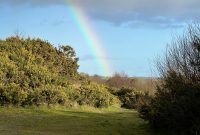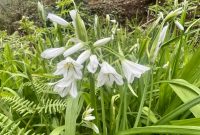2u.ie – making your day extra special
I took this photo yesterday afternoon in Curabinny Woods, near Carrigaline, Co.Cork, of wild garlic in flower. It grows abundantly at this time of year and especially in wooded areas.
On April 19th 1963 Johnny Cash released a single called “Ring of Fire” which became a worldwide hi
Maria Sharapova (Former Tennis Player) is 37
Paul O’Donovan (Olympic Irish Rowing Champion) is 30
Significance Of Today
Today is Poetry and the Creative Mind Day. Most of us were introduced to poetry and art at an early age, whether it’s the nursery rhymes sung by our parents, or the combination of poetry and art in books. Today is about appreciating the beauty of a good poem or getting creative and writing one of your own no matter how simple.
Interesting Quote for Today
“The greatest accomplishment is not in never falling, but in rising again after you fall.” ~Vince Lombardi
Saint For Today
Saint for today is Saint Emma. She lived in the city that is Bremen today. She was a great benefactor of churches, establishing many small parishes. She donated to the Bremen Cathedral. Her concern for the poor was legendary.
Did You Know😇
Did you know Hummingbirds are the only birds that can fly backwards. They are also able to hover and change flight direction quickly. These birds are such skilled flyers that they are often referred to as the flying ninja.
My Latest Videos🎥
I took my latest video at 6a.m last Thursday morning. It is the Dawn Chorus and spiritually is called ‘God’s Orchestra’. Even a plane passing by could not stop the beautiful sounds of the birds welcoming in the new day of Thursday April 11th
I really like this video that I took in Glengarrif Woods and it is simply called ‘Be Calm Be Quiet Be Still’
‘It doesn’t matter how you pray – with your head bowed in silence, or crying out in grief, or dancing. Churches are good for prayer, but so are garages and cars and mountains and showers and dance floors. Years ago I wrote an essay that began: Some people think that God is in the details, but I have come to believe that God is in the bathroom.’ ~ Anne Lamott
There is a growing awareness today how beneficial prayer can be in our spiritual lives. We sometimes think that prayer is long, complex and boring. We certainly feel it’s beyond our reach. But in many ways it is within our reach and especially when we apply prayer to those everyday events that happen in our daily lives. We can find God present in what we do right now, be it out for a walk, reading a book, working in the garden, getting in some exercise or watching the beauty of nature. The list can never be exhausted.
There is something powerful when you see communities gather together in prayer. We have all seen situations when there is a sudden or unexpected tragedy in a parish, the community gathers in their local church for a planned prayer service. The coming together gives purpose, meaning and hope. Those who attend will always say it brings great peace and comfort. It’s not about finding the right words, but that so many gather together as a show of support and love is so powerful. It is my heartfelt belief that God is also present bringing healing and love.
So if you find prayer difficult right now, just know that there are so many people praying for you right now. Even when all seems lost and gone, there is hope because of the support and prayers of others.
Thought For The Week is updated each Monday



